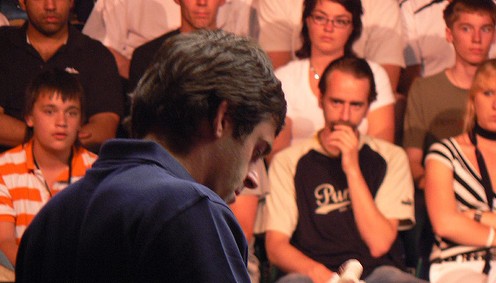O’Sullivan is a complex yet endearing enigma
It’s a half hearted project of mine to convince my housemate of the value of sport. The latest of our conversations seemed to be the broadest yet as he plainly asked me: “Why do you like sport?”
I’d been challenged on such broad terms before and returned my somewhat practised answer by saying that my love of sport depended, twofold, upon the controlled environment that sport provides for tests of physical prowess and, secondly (and probably most importantly), upon personalities.
In accordance with the broad nature of the debate, my housemate predictably returned with the question: ‘So who’s the biggest personality in sport then?’ My mind flitted between history’s obvious sporting characters such as Eric Cantona, Ayrton Senna and Muhammad Ali, but, unimpressed as ever, my housemate demanded a current example.
He then became disillusioned as I excitedly and assuredly tried to make a case for snooker’s Ronnie O’Sullivan.
I recognise that to the uninitiated, presenting a snooker player as the largest living sports personality seems absurd. Yet within the sport, and with a true understanding of what he has achieved in the manner he has achieved it, Ronnie O’Sullivan is as charismatic as it gets.
In the same way that Ayrton Senna and Eric Cantona’s characters have become so endearing, Ronnie O’Sullivan is a complex enigma, rather than a flawless dominator of his sport such as Roger Federer, the imperious figurehead of tennis so long.
He is a character more artistically endearing (he is best friends with Damien Hirst) than one of unchallenged steady dominance.
O’Sullivan has confessed on a number of occasions of his struggle with manic depression, and it seems that in this confession commentators have found the perfect model within which to describe his tumultuous career.
The mania of O’Sullivan’s career is made up of four previous world titles, over £6 million in prize money and his enduring record of the fastest maximum break within the sport – a spectacle worthy of convincing even the most sceptical of the value of snooker.
The obverse of this dizzy euphoria has seen O’Sullivan so apparently unable to cope with the pressure of major tournaments that he felt it necessary to walk out in the middle of a match with Stephen Hendry in 2005.
Within the sport, and with a true understanding of what he has achieved in the manner he has achieved it, Ronnie O’Sullivan is as charismatic as it gets.
He has subsequently threatened to quit the sport in almost every year in which he has competed. His most convincing declaration of a desire to quit yet came at the end of last year’s World Championship – a championship he won with ease.
True to form, O’Sullivan was back at this year’s World Championship with the same antagonistic, unsettled relationship with snooker. He gave one of his most interesting interviews to date after his quarter final victory over Stuart Bingham, asserting his continuing disillusionment with the game and stating that the only reason he was playing was for the money.
At the same time O’Sullivan was dominating at the table, coasting through round after round despite the tournament being his first taste of competitive play in a year.
Adding further to the enigma surrounding his character, O’Sullivan won his fifth World Championship yesterday and in a post-match interview reiterated his desire to retire and his admission that he did not miss snooker in his year out.
In all of this O’Sullivan seems to be proving that it is possible for a man to hate a discipline that he is the best at.
But the biggest lovers of snooker refuse to believe that O’Sullivan despises the game. They point to the grimaces and fist pumps that the man exhibits at the table as clear evidence for his continued love affair with snooker.
The same men place small odds on O’Sullivan being able to stay away from snooker for too long – laying claim to him as one of the most complex personalities in sporting history.

Comments